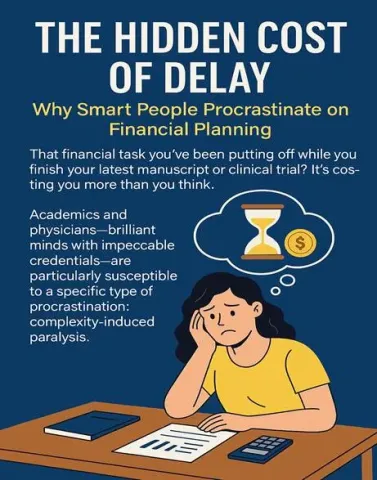The Hidden Cost of Delay: Why Smart People Procrastinate on Financial Planning
That financial task you've been putting off while you finish your latest manuscript or clinical trial? It's costing you more than you think.
Academics and physicians—brilliant minds with impeccable credentials—are particularly susceptible to a specific type of procrastination: complexity-induced paralysis. The more options you see, the more potential outcomes you can envision (and you can envision many), the harder it becomes to move forward.
It's not laziness. It's not even fear, exactly. It's the quintessential analysis paralysis that comes from seeing too many possibilities—the same thoroughness that makes you excellent at differential diagnosis or research design becomes a liability in personal finance.
Consider what's happening in your professionally-trained brain when you postpone financial planning:
You're not avoiding a decision. You're making one by default. Not deciding is still deciding—just with less control over the outcome. This is the same cognitive error you warn residents or graduate students against in clinical or research settings.
The technical term for this is "status quo bias," and it's particularly expensive in financial matters because of something Albert Einstein allegedly called the eighth wonder of the world: compound interest. The irony? You understand exponential growth perfectly well in your professional life—viral loads, cell proliferation, or compound annual growth rates in your research data—yet may fail to apply this understanding to your own finances.
Let's quantify this with a simple example that will appeal to your data-driven mind. Delaying retirement savings by just five years—from age 35 to 40, which is common for physicians just establishing their practice or academics securing tenure—can reduce your final balance by nearly 25% come retirement. That's the equivalent of working an extra five years at the end of your career. Would you rather have those five years of freedom, or five more years of departmental meetings and electronic health records?
For the typical academic or physician who finally starts earning real money in their mid-to-late 30s, this delay is even more costly. You already have a compressed earning timeline compared to other professionals. Every year of procrastination amplifies this disadvantage.
What makes this particularly insidious is that the cost is invisible. There's no bill, no late fee, no red flags. The consequences of postponing that 403(b) enrollment or delaying that meeting with a financial advisor specialized in medical professionals don't show up until decades later—when it's too late to fully rectify the situation.
The most dangerous procrastination isn't putting off tedious tasks—it's delaying important ones that have no immediate negative consequences. Just as a small, asymptomatic tumor might go unnoticed until it's critical, financial procrastination grows silently until retirement, when its full impact is finally revealed.
So what's the cure for this particular form of procrastination? Paradoxically, it's to do less, not more:
- Accept that in financial planning, an 80% perfect plan implemented today beats a 95% perfect plan implemented two years from now.
- Focus on the few financial decisions that truly matter: savings rate, basic asset allocation, tax efficiency, and insurance coverage. The rest is noise that your analytical mind will be tempted to optimize—resist this urge.
- Automate as much as possible to remove the ongoing decision points that trigger analysis paralysis.
Consider this your professional consultation from a financial colleague: the time to act is now, not after the next grant submission, publication, or committee assignment.
Smart But Overlooked: Most academic physicians don't realize that contributing to their hospital 457(b) plan could allow them to circumvent IRA income limits—even if they're already maxing their 403(b).
Ready to stop procrastinating on your financial future? The first step is the hardest. Schedule your initial consultation today and experience the relief of finally having a financial plan that matches your professional expertise. Your future self—the one who wants to retire before the next round of budget cuts—will thank you.


